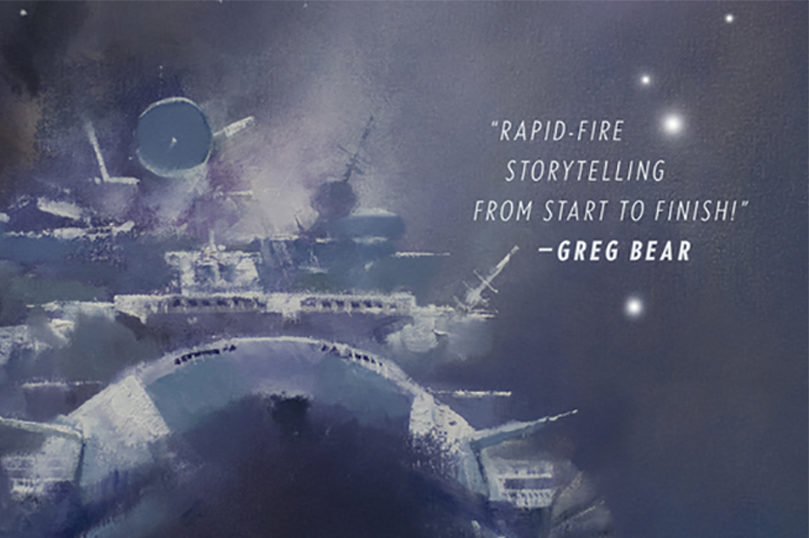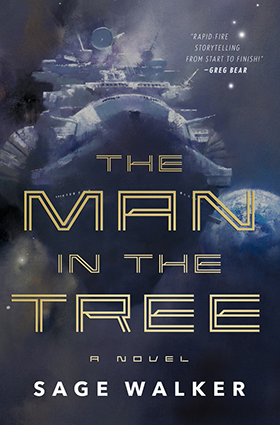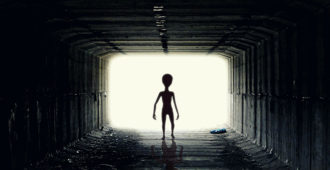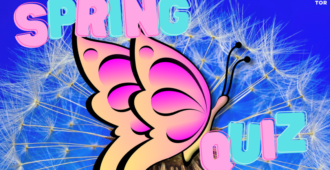Humanity’s last hope of survival lies in space…but will a random death doom the venture?
Our planet is dying and the world’s remaining nations have pooled their resources to build a seed ship that will carry colonists on a multi-generational journey to a distant planet.
Everything is set for a bright adventure…and then someone is found hanging dead just weeks before the launch. Fear and paranoia spread as the death begins to look more and more like a murder. The authorities want the case settled quickly and quietly so as not to cause panic…and to prevent a murderer from sabotaging the entire mission.
The Man in the Tree will become available September 12th. Please enjoy this excerpt.
Chapter One: Pleasure Centers
The sun in the hollow center of Kybele is supported by six Eiffel Towers.
In daylight, the clusters of petals near the top of the towers, closed, look like bulbous minarets. As they unfold, black shadows strike the fields and forests below. Kaleidoscopic patterns of ever-increasing darkness spread over the landscape until the edges of the petals almost touch each other and the day-bright interior of the asteroid is dimmed for night.
Kybele was Earth’s first, perhaps Earth’s only, seedship, and she existed because there was a chance, a statistically infinitesimal chance, that someday she or a daughter ship of hers might return, headed back toward Earth with hope and life. Kybele’s singular existence was possible because of asteroid mining, hope, and diverted resources from an Earth that said it couldn’t afford her. The Mars colony, small and underground, was only viable because of money from asteroid mining. The time frame for terraforming Mars, a planet with no seas and no magnetic core, was centuries longer than Kybele’s voyage.
Earth’s humans were in a battle for survival that constantly teetered near disaster. Kybele was a long-shot insurance policy of sorts. Some very good minds had run the numbers and found an intersection, a window, between dwindling resources and increasing technical ability where a seedship could be built. Kybele was that intersection.
Helt Borresen, Incident Analyst for the seedship, walked spinward from the base of Athens tower on a path he knew well. He sat down beside a creek and fitted his back against the trunk of an aspen. The creek talked a little of this and that.
This was a private place, one he liked. He came here for solitude, but last night and the night before he’d caught glimpses of an interesting woman, barely seen in the shadows, a woman who moved quickly and quietly, as if she were watching something but didn’t want to be seen.
Downhill from the aspen, a marshy meadow flanked the creek. Tall grasses grew there, late summer yellow, some of them seeding for next year. Cattails marked soggy ground. Beyond the meadow, anti-spinward, the deep gash of Petra canyon was darker than the forest that grew to its rim. Beyond it, up the curved inner surface of Kybele’s hollow interior, the forest ended abruptly at the edge of croplands, squares of plowed black soil and yellow stubble, striped by shadows from the legs of the towers and going monochrome in the fading light. The warmth of an October day began to fade and a cool breeze came up to rustle the cattails. Kybele’s night was programmed to replicate the twenty-eight-day cycles of Earth’s moon, and as Helt sat, half-dozing, the light dimmed toward quarter moonlight, dark enough to silver the grass and turn the shadows black.
A flicker of white brought his focus back to the meadow. White-tailed deer, a dozen or so, appeared in the tall grass, as quickly and quietly as if they had been popped into place by a special-effects team. Two yearling bucks, their antlers only brave stubs, were with the females, but none of the big guys. The herd was close enough that Helt heard grass tear as they munched their way toward the water. He had never been able to see a herd of deer, or elk, or reindeer, without counting them. Fourteen. The herd went downhill in the tall grass and vanished.
The show was over. He thought about getting up.
And then he didn’t, for the pair of young bucks reappeared at the edge of the meadow. The woman he had seen here briefly last night stepped out of the pines on the far side of the clearing. She had a bottle tied to her belt and something small gripped in her right hand.
The deer came to her. She was on the far side of the deer from Helt, so he couldn’t see what she did to the neck of one and then the other. Whatever it was, when she finished, she shoved at the neck of the deer she had just handled. It didn’t move away. The little buck lowered his head to have the skin around the nubs of his antlers scratched. His buddy decided he needed some attention, too.
The woman groomed both of them for a little while. Then she laughed, low and soft, and clapped her hands. The deer bounced away. She unhooked a bottle from her belt, put things in it, and screwed down the lid. The motions caused the interlocked squares of her plaid shirt to tighten and loosen over her breasts in pleasant ways.
She turned and walked toward Helt’s aspen. He supposed she saw him. He was visible enough against the white trunk of the tree, so he stood up. She was a tall woman. The top of her head would have fit comfortably just under his chin. She had dark hair, tied back. The faux moonlight made it shine.
She stopped walking.
“Hi,” Helt said.
She gave a little shrug. It looked liked resigned acceptance of his presence. “Hello,” she said aloud. “I disturbed you.”
“I enjoyed watching you. I’m only a little disturbed.”
“About what?”
“About what you did to call them in.”
“Oh.” She reached in her shirt pocket and pulled out a little control box. She stepped closer to Helt, to show him. “They have electrodes in their pleasure centers, and the buzz they get gets stronger the closer they come to this. The guys you saw were numbers thirty-three and thirty-five. I pushed their buttons. They came running.”
She was close enough that he could smell her hair, her skin. He didn’t smell perfume, just clean healthy human, and whatever scent there is that tells a hindbrain a woman is nearby. She was maybe ten years younger than Helt and her eyebrows were dark wings above her large eyes. In the moonlight, he thought her eyes were gray.
Helt felt lonely. He was lonely. He had no one special right now, and hadn’t for a couple of years. Well, four, actually.
“I’m disappointed.”
“Why?”
“It’s just tech. I wanted to think it was magic.”
“It’s sufficiently advanced to seem so. To a deer.”
“Clarke’s third law. Advanced technology looks like magic. Did you ever read any of his novels?” Helt asked.
“No. I came across that quote once and liked it.”
The novels had been written in the twentieth century. The 2209 Helt lived in was very different from the future the old dreamer had imagined. Humanity had stayed at the edge of disaster, as ever, and survived some of its own failings-so far.
“I’m Elena,” she said. “Biosystems.”
“Helt. Systems Support.” He wondered why he’d never met her. He wondered how long she’d been on board.
They started walking toward Athens tower.
“Thirty-three and thirty-five will be leaving the herd soon, out for a tour of enforced bachelorhood,” Elena said. “The stags will see to that. I needed some blood from them. We monitor hormone levels, nutrition, muscle mass, many other things.” She spoke standard Omaha English, but there was a touch of hesitation, of indrawn breath, before some of her words. “These yearling bucks have stayed with their moms a bit longer than we expected,” Elena said. “If they’re developing normally, their testosterone levels should be lower than they were a few weeks ago. Rutting season is almost over.”
Helt didn’t mind a discussion of testosterone levels at all. His were rising a little, and he decided to take her willingness to play biology teacher as a positive sign.
Beneath the support pillars of the towers, the ground was in permanent shadow. People walked there because it was easy. Nothing much grew underfoot. Helt thought of giant mushrooms, blind insects, cave-adapted species, spooky creatures made of old fantasy. Perhaps he would avoid mentioning them to the SysSu techs. They might manufacture some displays to jump out and go “Boo!” Just because they could.
“Are you worried that the deer won’t be guy enough for their jobs?” Helt asked.
“That’s what I’m checking. They have a lot of adapting to do,” Elena said. “They seem to be thriving at half-g. They love to jump, but we’ve seen no broken legs yet, so they’ve sorted that out. They can’t be really wild with this much human contact; there’s taming, of sorts. They don’t get shot at, so they don’t flee us the way their cousins back home do. And there aren’t any large predators to give their adrenals a workout.”
No large predators, except for humans. When it came time to thin the herd, to harvest venison, would Biosystems establish a hunt? Would running the deer become a sport on Kybele, good for working off human frustrations and sharpening the survival skills of the herd? Surely Biosystems had thought of this, and had made a list of pros and cons. Helt would look to see what they were, later. “Do you think the fear of getting eaten would keep them healthier?” he asked.
“Perhaps. They are active without that, so far. They play. The males battle each other. But there’s so much to think about. Maybe they’re missing mosquito bites, or something,” Elena said.
“You’re teasing me,” Helt said.
“Yes.”
“Please tell me you won’t put mosquitoes up here.”
The woman named Elena looked up at him and smiled. He still couldn’t tell exactly what color her eyes were. The lights near the elevator door made them look sort of hazel, maybe. Her plaid shirt was black and white and gray.
He hoped she liked men who were sort of sand-colored all over. He hoped she didn’t mind a five o’clock shadow with a few white whiskers in it. He hoped she didn’t mind that his hair looked like someone had cut it with a pair of office scissors, for that’s what he had done four days ago when he’d noticed it was falling in his eyes.
Helt wished the walk had been longer. He liked Elena. Walking with a woman beside him felt good.
The elevator was large enough for twenty. There was no good reason for him to stand really close to her as it took them down from Center, so he didn’t.
The doors began to slide open on Level One. “Could we keep talking?” Helt asked.
“I really have to get back to my lab before my blood gets hot,” Elena said. She looked down at the thermos bottle clipped to her belt, tapped it, and walked away. She was going toward the train station that would take her back to Stonehenge, he supposed.
But he’d seen a little smile at the corner of her mouth.
His interface gave him her name; Elena, Biosystems, was Elena Maury, MD, PhD. He found a headshot that gave him a good look at her huge eyes, her high cheekbones. Her eyes, in the photo, looked more hazel than the gray he’d seen in moonlight and in the elevator lighting.
That was enough to know for now.
Copyright © 2017 by Sage Walker
Order Your Copy













